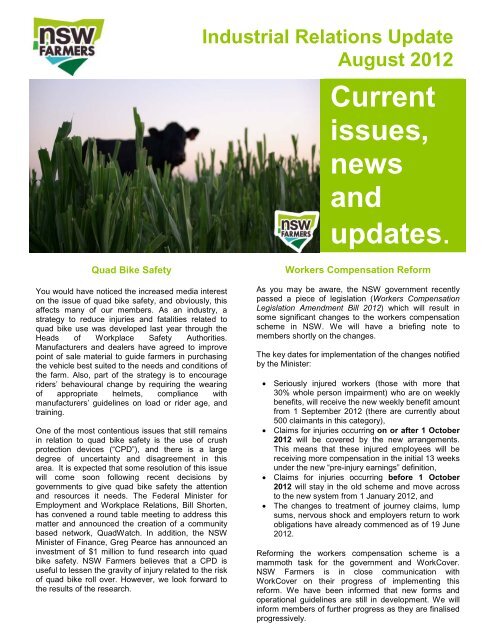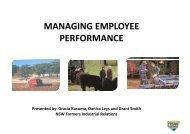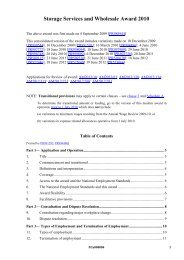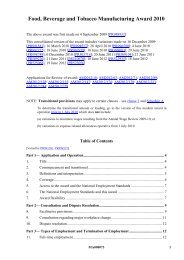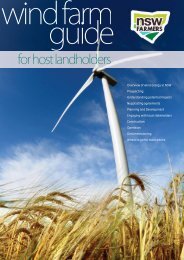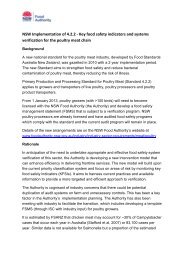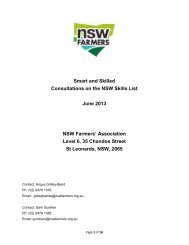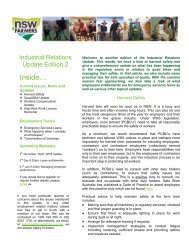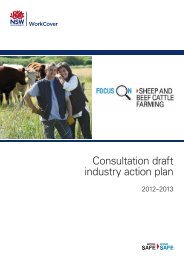Current issues, news and updates. - NSW Farmers Association
Current issues, news and updates. - NSW Farmers Association
Current issues, news and updates. - NSW Farmers Association
Create successful ePaper yourself
Turn your PDF publications into a flip-book with our unique Google optimized e-Paper software.
Industrial Relations Update<br />
August 2012<br />
<strong>Current</strong><br />
<strong>issues</strong>,<br />
<strong>news</strong><br />
<strong>and</strong><br />
<strong>updates</strong>.<br />
Quad Bike Safety<br />
You would have noticed the increased media interest<br />
on the issue of quad bike safety, <strong>and</strong> obviously, this<br />
affects many of our members. As an industry, a<br />
strategy to reduce injuries <strong>and</strong> fatalities related to<br />
quad bike use was developed last year through the<br />
Heads of Workplace Safety Authorities.<br />
Manufacturers <strong>and</strong> dealers have agreed to improve<br />
point of sale material to guide farmers in purchasing<br />
the vehicle best suited to the needs <strong>and</strong> conditions of<br />
the farm. Also, part of the strategy is to encourage<br />
riders’ behavioural change by requiring the wearing<br />
of appropriate helmets, compliance with<br />
manufacturers’ guidelines on load or rider age, <strong>and</strong><br />
training.<br />
One of the most contentious <strong>issues</strong> that still remains<br />
in relation to quad bike safety is the use of crush<br />
protection devices (“CPD”), <strong>and</strong> there is a large<br />
degree of uncertainty <strong>and</strong> disagreement in this<br />
area. It is expected that some resolution of this issue<br />
will come soon following recent decisions by<br />
governments to give quad bike safety the attention<br />
<strong>and</strong> resources it needs. The Federal Minister for<br />
Employment <strong>and</strong> Workplace Relations, Bill Shorten,<br />
has convened a round table meeting to address this<br />
matter <strong>and</strong> announced the creation of a community<br />
based network, QuadWatch. In addition, the <strong>NSW</strong><br />
Minister of Finance, Greg Pearce has announced an<br />
investment of $1 million to fund research into quad<br />
bike safety. <strong>NSW</strong> <strong>Farmers</strong> believes that a CPD is<br />
useful to lessen the gravity of injury related to the risk<br />
of quad bike roll over. However, we look forward to<br />
the results of the research.<br />
Workers Compensation Reform<br />
As you may be aware, the <strong>NSW</strong> government recently<br />
passed a piece of legislation (Workers Compensation<br />
Legislation Amendment Bill 2012) which will result in<br />
some significant changes to the workers compensation<br />
scheme in <strong>NSW</strong>. We will have a briefing note to<br />
members shortly on the changes.<br />
The key dates for implementation of the changes notified<br />
by the Minister:<br />
• Seriously injured workers (those with more that<br />
30% whole person impairment) who are on weekly<br />
benefits, will receive the new weekly benefit amount<br />
from 1 September 2012 (there are currently about<br />
500 claimants in this category),<br />
• Claims for injuries occurring on or after 1 October<br />
2012 will be covered by the new arrangements.<br />
This means that these injured employees will be<br />
receiving more compensation in the initial 13 weeks<br />
under the new “pre-injury earnings” definition,<br />
• Claims for injuries occurring before 1 October<br />
2012 will stay in the old scheme <strong>and</strong> move across<br />
to the new system from 1 January 2012, <strong>and</strong><br />
• The changes to treatment of journey claims, lump<br />
sums, nervous shock <strong>and</strong> employers return to work<br />
obligations have already commenced as of 19 June<br />
2012.<br />
Reforming the workers compensation scheme is a<br />
mammoth task for the government <strong>and</strong> WorkCover.<br />
<strong>NSW</strong> <strong>Farmers</strong> is in close communication with<br />
WorkCover on their progress of implementing this<br />
reform. We have been informed that new forms <strong>and</strong><br />
operational guidelines are still in development. We will<br />
inform members of further progress as they are finalised<br />
progressively.
Employment law<br />
reminders…<br />
helping you to<br />
remain compliant.<br />
What’s the<br />
difference<br />
between IR<br />
Basics <strong>and</strong> IR<br />
Essentials<br />
membership?<br />
All <strong>NSW</strong> <strong>Farmers</strong>’ producer<br />
members have an IR Basics (IRB)<br />
membership. This gives them<br />
access to phone support (4 x per<br />
year) <strong>and</strong> limited access to the IR<br />
website.<br />
For an additional fee, members<br />
can upgrade to the IR Essentials<br />
(IRE) membership option giving<br />
them unlimited access to the<br />
support services provided by the<br />
IR team, including assistance with<br />
drafting all forms of employment<br />
documentation such as contracts,<br />
policies <strong>and</strong> Individual Flexibility<br />
Agreements (IFA’s).<br />
This month: The importance of notification of workplace<br />
injuries<br />
It has come to our attention recently that a number of members<br />
have been penalised as a result of failing to notify their scheme<br />
agents of injuries within the specified time frame, so it was timely<br />
to give a reminder about the importance of this.<br />
In the first instance, whenever an injury occurs in the workplace,<br />
the employer needs to be notified as soon as possible. This<br />
requirement needs to be communicated to all employees <strong>and</strong><br />
managers, so that when an injury does occur, the employer is not<br />
placed in a position of failing to notify simply by virtue of the fact<br />
that they were unaware of the injury occurring. It may be<br />
appropriate to implement a workplace health <strong>and</strong> safety policy in<br />
your workplace that includes a clause on injury notification to<br />
ensure that everyone in the workplace underst<strong>and</strong>s the<br />
requirements in relation to notification.<br />
Once the employer has been notified of the injury, the injury<br />
should be entered into an injury register. We have provided a<br />
template injury register document which members may wish to<br />
use for these purposes. It can be accessed through the IR<br />
website here.<br />
Importantly, the employer has a legal requirement to notify the<br />
Scheme Agent or insurer within 48 hours of the injury being<br />
notified. If this notification is not made within the specified<br />
timeframe, employers are at risk of paying a claims excess on the<br />
claim, which is the equivalent of one weeks pay. Notification of the<br />
scheme agent can be done in a number of ways including phone<br />
<strong>and</strong> email.
Employee or contractor?<br />
<strong>Farmers</strong> often engage contractors on the farm to help them out in busy<br />
times or to do jobs they are unable to do. Many farmers believe that hiring<br />
someone as a contractor means that they don’t have to worry about the<br />
various laws which apply to employment. This is not always the case.<br />
The law says that just because a person has an ABN <strong>and</strong> calls themself a<br />
contractor does not necessarily stop them being regarded as an employee<br />
- <strong>and</strong> this means you could be liable for such things as employment<br />
entitlements, superannuation guarantee charge <strong>and</strong> workers<br />
compensation.<br />
So how do you decide if the law will support someone’s claim to<br />
being a contractor?<br />
Sometimes it will be easy to work out, for instance in the case of a<br />
contractor who provides a crop spraying service to you <strong>and</strong> others in the<br />
district.<br />
At other times it may not be so clear, for instance if your neighbour comes<br />
in <strong>and</strong> does some tractor work for you. Initially, the courts applied the<br />
control test, that if you can control the way work is done, where it is done<br />
<strong>and</strong> when it is done, the person is an employee. If not, they are an<br />
independent contractor.<br />
Over time the courts have adopted a totality approach where various<br />
different considerations are taken into account, <strong>and</strong> decide if on balance<br />
the total picture points to employment or independent contracting. We have<br />
summarised matters considered by the courts into a to assist you in<br />
considering whether a worker is a contractor or employee. You can access<br />
the list via the IR website here.<br />
The Australian Tax Office (ATO) has a useful online decision tool to assist<br />
in distinguishing between employee <strong>and</strong> contractor for the purpose of<br />
deciding whether you will need to make superannuation guarantee<br />
contributions. The tool can be found here. WorkCover also has an online<br />
self-assessment tool designed to assist employers to determine whether a<br />
person is an employee or contractor for workers compensation purposes.<br />
What are the consequences for not correctly classifying a<br />
person as a contractor?<br />
An employer may be in trouble under three heads of claim for wrongly<br />
classifying a person as a contractor rather than an employee. First, an<br />
employer may be required to back-pay superannuation guarantee<br />
contributions <strong>and</strong> the relevant charges. Secondly, an employer may be<br />
required to back-pay workers compensation premium because the wage<br />
declaration for premium calculation is inaccurate. Thirdly, the Fair Work Act<br />
2009 provides for penalties for sham contracting. Falsely classifying an<br />
employee as a contractor is breach of the Fair Work Act 2009 sham<br />
contracting provisions.<br />
What is an IFA?<br />
Award covered employees need to<br />
be given the conditions prescribed<br />
by the Award <strong>and</strong> be paid in<br />
accordance with the Award<br />
provisions. Awards generally<br />
prescribe a base rate of pay <strong>and</strong><br />
additional penalties <strong>and</strong> loadings<br />
payable in certain circumstances<br />
(e.g. overtime penalty, annual leave<br />
loading).<br />
Employers in agreement with<br />
employees can use Individual<br />
Flexibility Agreements (IFA’s) to<br />
vary certain award conditions.<br />
IFA’s are not a substitute for an<br />
employment contract but they<br />
provide a degree of flexibility in<br />
adopting a flat hourly rate or above<br />
award salary by absorbing award<br />
entitlements (e.g. annual leave<br />
loading, penalty rates, overtime<br />
rates, allowances), thereby<br />
simplifying the administration for<br />
payment of wages.<br />
In implementing an IFA, employers<br />
must ensure that the employees pay<br />
is greater than the award condition<br />
by applying the Better Off Overall<br />
Test (BOOT).<br />
In essence, by adopting an IFA, the<br />
employee should not be worse off<br />
compared to the award conditions<br />
they would be entitled to.<br />
Employees must willingly agree to<br />
the conditions of the IFA.<br />
See Grant Smith, IR Advisor,<br />
talking about IFAs here.


